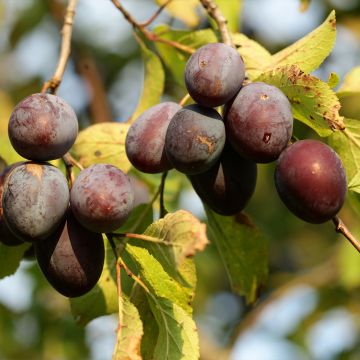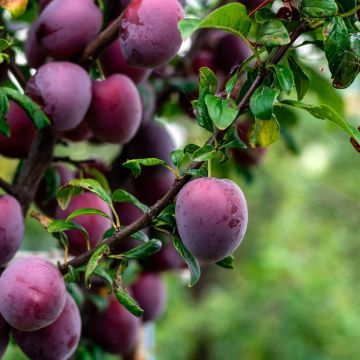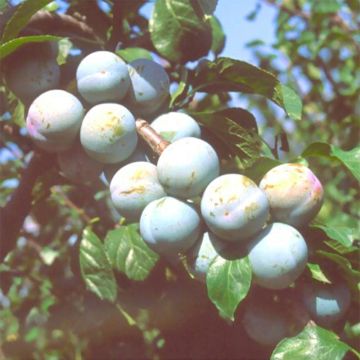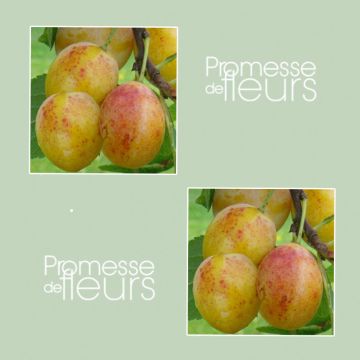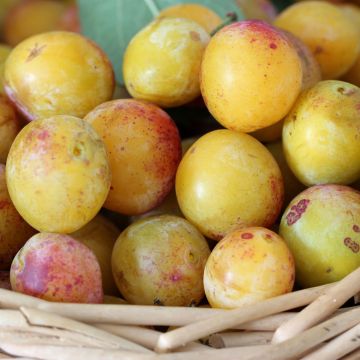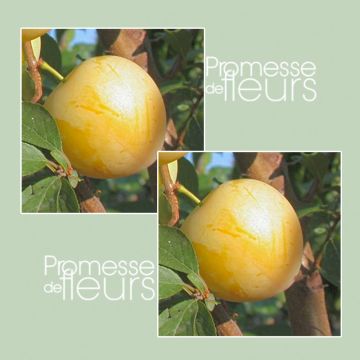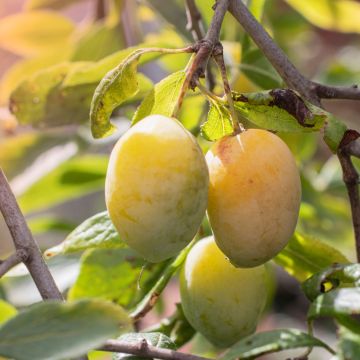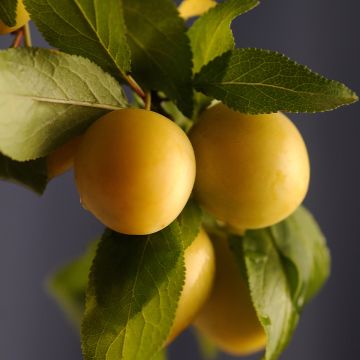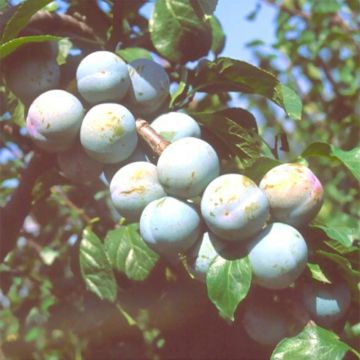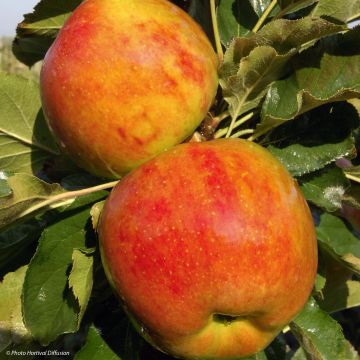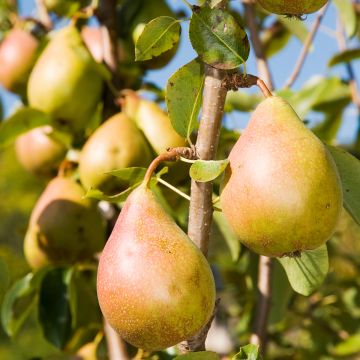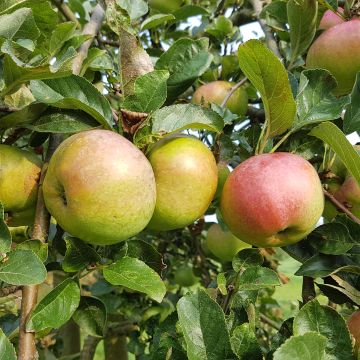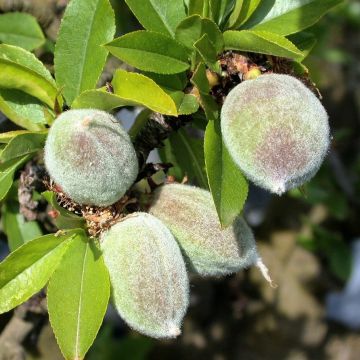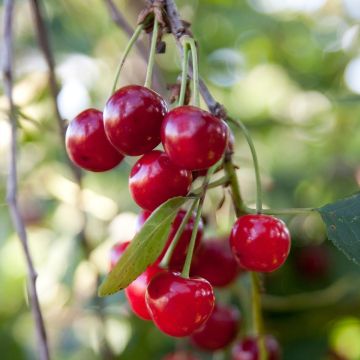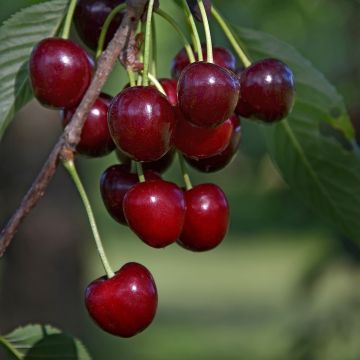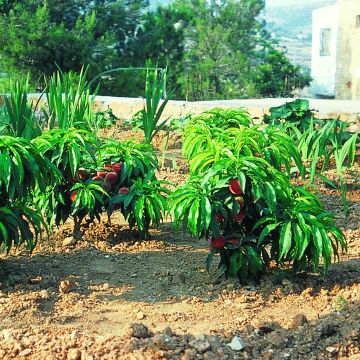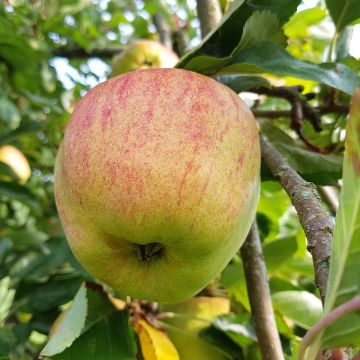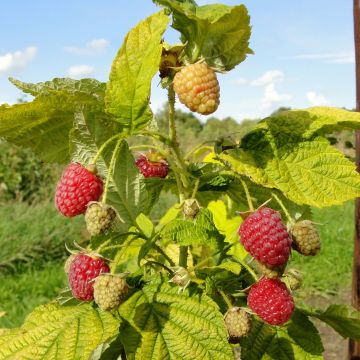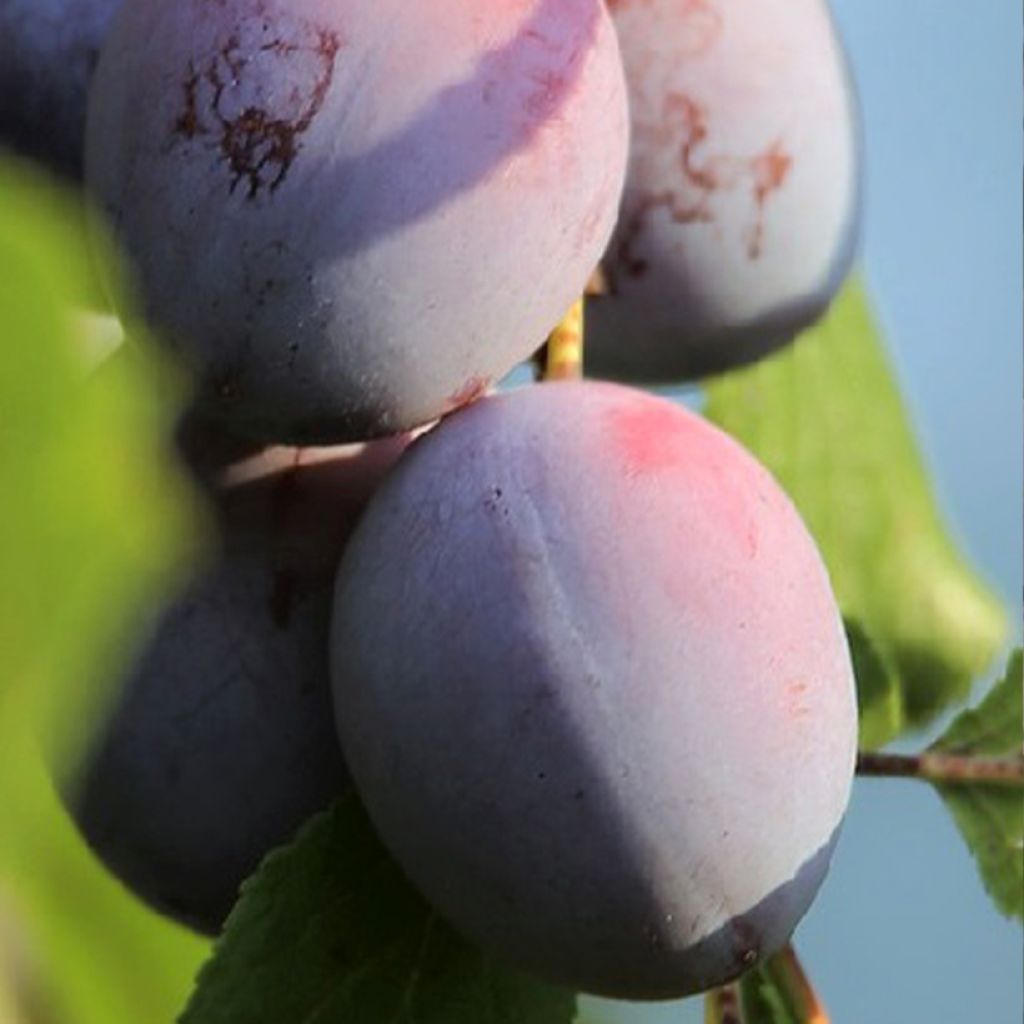

Prunus domestica Hanna - Plum
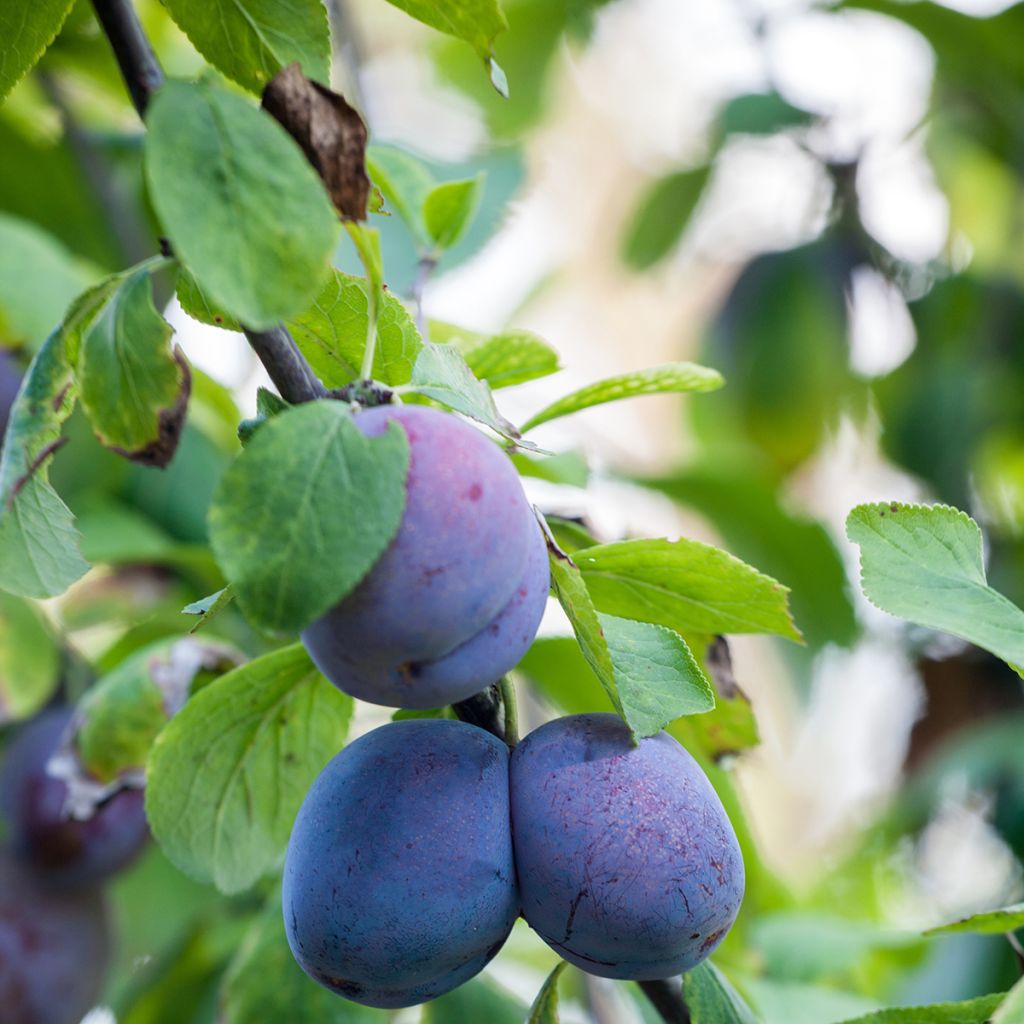

Prunus domestica Hanna - Plum
Prunus domestica Hanna - Plum
Prunus domestica Hanna
Plum
This item cannot be shipped to the selected country
Delivery charge from €5.90
More information
Schedule delivery date,
and select date in basket
This plant carries a 6 months recovery warranty
More information
We guarantee the quality of our plants for a full growing cycle, and will replace at our expense any plant that fails to recover under normal climatic and planting conditions.
From €5.90 for pickup delivery and €6.90 for home delivery
Express home delivery from €8.90.
Description
The Dwarf Plum or Prunus domestica 'Hanna' is a variety of Plum that can be planted in any garden, in a container, on a terrace, or a balcony. It forms a miniature tree that is only 1.5m (5ft) tall and less than 1m (3ft) wide. Self-fertile, it blooms in May with white flowers that attract bees. These flowers develop into oval prunes, with a beautiful blue colour, ripe in September and October. The flesh is yellow to orange, juicy, sweet, and can be eaten fresh, in tarts, or made into jam. This Plum tree is very hardy and should be grown in full sun with well-drained soil.
Plum trees belong to the vast family of Rosaceae, which includes most of our temperate climate fruit trees (Apple, Pear, Apricot, Peach, Cherry, Quince...) as well as small fruits (Blackberries, Raspberries, Strawberries). The Prunus genus itself is extremely diverse, with over 300 species, including both fruiting trees (Almond, Peach...) and ornamental trees and shrubs. Prunus domestica is a small, hardy tree that can grow up to 1000m (3281ft) in altitude. It is believed to be originally from Asia Minor (Syria) and was introduced to Rome along with many other species during the Roman conquests. According to some authors, its introduction to Europe is more likely to be related to the Crusades, who really knows?
'Hanna' is a particularly interesting variety for small gardens due to its considerably smaller size compared to the botanical species. This variety is self-fertile and does not require pollination from another Plum tree. In May, it produces clusters of simple white flowers, a few centimetres in diameter, with 5 petals, which are melliferous. Once pollinated, the flowers develop into drupes, which are fleshy fruits with a stone, known as plums. These plums are oval-shaped and have a beautiful dark blue colour. They ripen in September and can be harvested until October. The flesh is juicy, sweet, and pleasantly refreshing. These fruits can be eaten fresh or used in tarts and jams. Plums are refreshing fruits, relatively low in calories, and rich in vitamin E.
Hardy down to at least -20°C (-4°F), this tree is easy to grow, resistant to diseases, and not very demanding once well established. If you choose to grow this Plum tree in a container, make sure to water it regularly to avoid root drying, and prefer plastic containers with "double skin" (with an insulating layer of air) or thick terracotta containers.
The Dwarf Plum 'Hanna' will allow you to enjoy fruit without taking up space in your garden or even on your balcony. Nowadays, there is a wide range of dwarf fruit trees that can be grown this way. If you like Apple trees, you will love 'Croquella', a self-fertile variety of crunchy and fragrant red apples, with the same size as 'Hanna'. If you like cherries, the Columnar Cherry 'Sylvia' will delight you with its upright habit, reaching 1.50m (5ft) in height. The Dwarf Peach 'Amber Pix Zee' with its long and narrow decorative leaves has the same compact size as the previous ones, as well as the Dwarf Pear 'Garden Pearl' with fruits as large as the classic varieties. So you can enjoy delicious fruits throughout the summer, even in a small garden...
Report an error about the product description
Plant habit
Fruit
Flowering
Foliage
Botanical data
Prunus
domestica
Hanna
Rosaceae
Plum
Cultivar or hybrid
Other Plum Trees
Planting and care
This dwarf 'Hanna' Plum tree prefers deep clay-limestone soil, slightly moist or at least not too dry. It can adapt to other types of soil, but it is quite demanding in terms of sunlight. Hardy down to approximately -20°C (-4°F), it adapts to most climates in the UK.
Dig a planting hole that is 40 to 50cm (16 to 20in) on all sides. This dwarf tree appreciates some humidity, so make sure to water it regularly in summer and autumn during the first few years. Once well rooted, it is a resilient and low-maintenance tree.
Its small size makes it easy to grow in a pot, on a sunny balcony or terrace. Keep an eye on watering, as container gardening is more drying than planting in the ground, as the tree cannot extend its roots into the soil to find water.
Planting period
Intended location
Care
This item has not been reviewed yet - be the first to leave a review about it.
Fruit trees for small gardens
Haven't found what you were looking for?
Hardiness is the lowest winter temperature a plant can endure without suffering serious damage or even dying. However, hardiness is affected by location (a sheltered area, such as a patio), protection (winter cover) and soil type (hardiness is improved by well-drained soil).

Photo Sharing Terms & Conditions
In order to encourage gardeners to interact and share their experiences, Promesse de fleurs offers various media enabling content to be uploaded onto its Site - in particular via the ‘Photo sharing’ module.
The User agrees to refrain from:
- Posting any content that is illegal, prejudicial, insulting, racist, inciteful to hatred, revisionist, contrary to public decency, that infringes on privacy or on the privacy rights of third parties, in particular the publicity rights of persons and goods, intellectual property rights, or the right to privacy.
- Submitting content on behalf of a third party;
- Impersonate the identity of a third party and/or publish any personal information about a third party;
In general, the User undertakes to refrain from any unethical behaviour.
All Content (in particular text, comments, files, images, photos, videos, creative works, etc.), which may be subject to property or intellectual property rights, image or other private rights, shall remain the property of the User, subject to the limited rights granted by the terms of the licence granted by Promesse de fleurs as stated below. Users are at liberty to publish or not to publish such Content on the Site, notably via the ‘Photo Sharing’ facility, and accept that this Content shall be made public and freely accessible, notably on the Internet.
Users further acknowledge, undertake to have ,and guarantee that they hold all necessary rights and permissions to publish such material on the Site, in particular with regard to the legislation in force pertaining to any privacy, property, intellectual property, image, or contractual rights, or rights of any other nature. By publishing such Content on the Site, Users acknowledge accepting full liability as publishers of the Content within the meaning of the law, and grant Promesse de fleurs, free of charge, an inclusive, worldwide licence for the said Content for the entire duration of its publication, including all reproduction, representation, up/downloading, displaying, performing, transmission, and storage rights.
Users also grant permission for their name to be linked to the Content and accept that this link may not always be made available.
By engaging in posting material, Users consent to their Content becoming automatically accessible on the Internet, in particular on other sites and/or blogs and/or web pages of the Promesse de fleurs site, including in particular social pages and the Promesse de fleurs catalogue.
Users may secure the removal of entrusted content free of charge by issuing a simple request via our contact form.
The flowering period indicated on our website applies to countries and regions located in USDA zone 8 (France, the United Kingdom, Ireland, the Netherlands, etc.)
It will vary according to where you live:
- In zones 9 to 10 (Italy, Spain, Greece, etc.), flowering will occur about 2 to 4 weeks earlier.
- In zones 6 to 7 (Germany, Poland, Slovenia, and lower mountainous regions), flowering will be delayed by 2 to 3 weeks.
- In zone 5 (Central Europe, Scandinavia), blooming will be delayed by 3 to 5 weeks.
In temperate climates, pruning of spring-flowering shrubs (forsythia, spireas, etc.) should be done just after flowering.
Pruning of summer-flowering shrubs (Indian Lilac, Perovskia, etc.) can be done in winter or spring.
In cold regions as well as with frost-sensitive plants, avoid pruning too early when severe frosts may still occur.
The planting period indicated on our website applies to countries and regions located in USDA zone 8 (France, United Kingdom, Ireland, Netherlands).
It will vary according to where you live:
- In Mediterranean zones (Marseille, Madrid, Milan, etc.), autumn and winter are the best planting periods.
- In continental zones (Strasbourg, Munich, Vienna, etc.), delay planting by 2 to 3 weeks in spring and bring it forward by 2 to 4 weeks in autumn.
- In mountainous regions (the Alps, Pyrenees, Carpathians, etc.), it is best to plant in late spring (May-June) or late summer (August-September).
The harvesting period indicated on our website applies to countries and regions in USDA zone 8 (France, England, Ireland, the Netherlands).
In colder areas (Scandinavia, Poland, Austria...) fruit and vegetable harvests are likely to be delayed by 3-4 weeks.
In warmer areas (Italy, Spain, Greece, etc.), harvesting will probably take place earlier, depending on weather conditions.
The sowing periods indicated on our website apply to countries and regions within USDA Zone 8 (France, UK, Ireland, Netherlands).
In colder areas (Scandinavia, Poland, Austria...), delay any outdoor sowing by 3-4 weeks, or sow under glass.
In warmer climes (Italy, Spain, Greece, etc.), bring outdoor sowing forward by a few weeks.


































